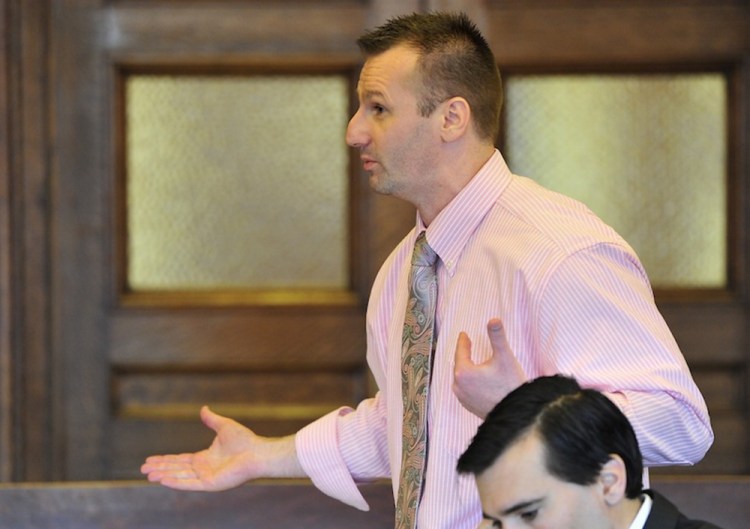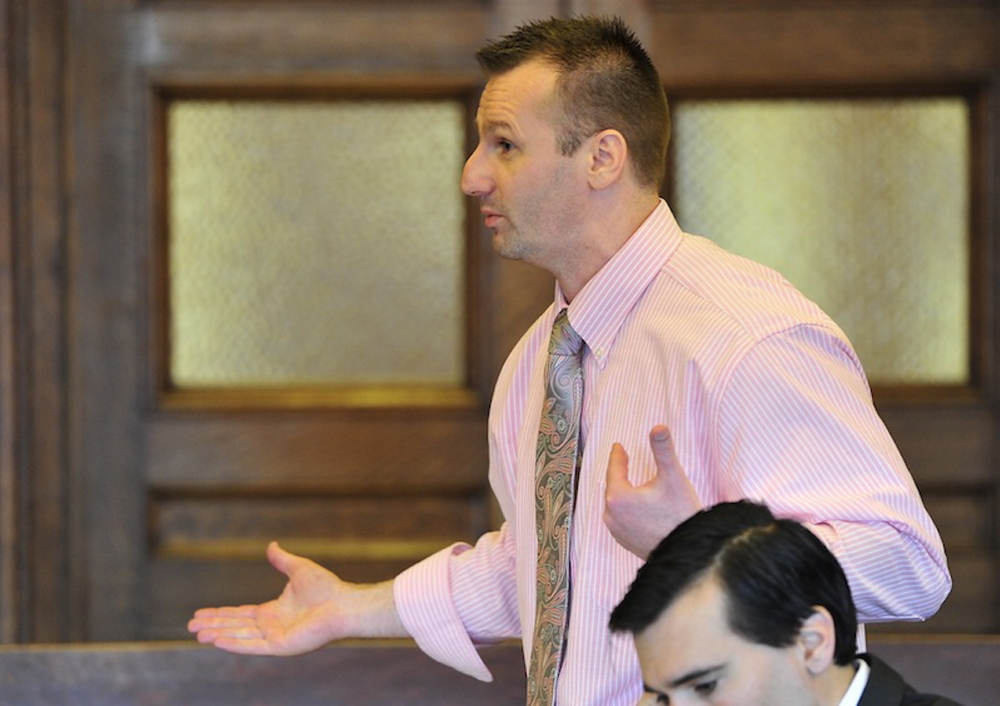In an unprecedented case in Maine, the state’s highest court has ruled that a Scarborough man facing robbery charges forfeited his constitutional right to an attorney prior to a 2014 trial.
The Maine Supreme Judicial Court denied an appeal by Joshua Nisbet, 38, whose continued uncooperative and threatening behavior toward defense attorneys prompted a lower court judge to conclude that he no longer had rights to counsel, forcing Nisbet to represent himself.
“Nisbet waived his right to counsel because he willfully engaged in misconduct that the court appropriately warned him would result in the loss of representation,” the supreme court decision read. “Nisbet also forfeited his right to counsel because he engaged in egregious misconduct that manipulated that right in a way that was substantially detrimental to the court’s ability to administer justice, and because no lesser alternative was available to the court.”
The 31-page decision, made public on Tuesday, comes more than five months after the case was presented by Assistant Attorney General Leanne Robbin, who represented the state, and Jamesa Drake, who appeared on behalf of Nisbet.
Robbin said Tuesday that Nisbet had been warned repeatedly and told that if he was forced to represent himself, he would be at a distinct disadvantage.
“It’s not unusual for a defendant to go through one or two attorneys, especially in a complex case,” she said. “This was not a complex case.”
Drake did not respond Tuesday to a request for comment on the court’s decision.
Nisbet was first charged with robbing a South Portland convenience store at knife-point back in July 2011. He was identified by police from security footage that showed his distinctive neck tattoo.
At his initial court appearance, Nisbet was appointed an attorney, Randall Bates. The case was scheduled for trial in November 2011 and then continued until the following January, but Bates asked to withdraw as counsel before that. In his motion to withdraw, Bates said the relationship between him and his client had “irrevocably broken down.”
A judge appointed another attorney, Robert LeBrasseur, to represent Nisbet. Roughly four months later, LeBrasseur also asked to withdraw, claiming that his client was hostile to his staff during phone conversations. In May 2012, a judge dismissed LeBrasseur and appointed Kristine Hanly as counsel.
Hanly stayed with the case for about six months and used much of that time to review discovery, according to court documents. By January 2013, though, she reached the same point as her two predecessors. In her motion to withdraw, Hanly wrote, “Due to comments and conduct of the client, counsel believes that the attorney-client relationship has been irretrievably damaged.”
While Nisbet told the judge that he was working on retaining his own attorney to replace Hanley, no attorney was retained and the judge appointed two new attorneys, Neale Duffett and Jon Gale, to take Nisbet’s case. Nisbet was warned that these would be his final court-appointed attorneys.
By late summer 2013, Nisbet’s relationship with Duffett and Gale had soured. He asked to remove them. The judge warned Nisbet that he was “at the end of the line on attorneys,” which prompted the defendant to back down. The trial was rescheduled – again – for October 2013.
Before that trial could happen, Nisbet again sparred with his attorneys. In November, he again filed a motion to dismiss Duffett and Gale and argued that he didn’t think the attorneys were working in his best interest. In December 2013, Duffett and Gale filed their own motion to withdraw, claiming that Nisbet had asked them to engage in unethical conduct.
Before the judge decided that motion, he told Nisbet explicitly that if Duffett and Gale were dismissed, he would have to represent himself.
“Well, I guess I’ll keep my lawyers. You have extorted me. Good job,” Nisbet said, according to court documents.
The court deferred action, which kept Duffett and Gale in place, but the attorneys submitted a second motion to withdraw in February 2014. During a meeting with Nisbet at the jail before the hearing, he threatened Gale, saying, “I will never forget what you’ve done. You have (expletive) with the wrong guy. I don’t care if I get 15 years, when I get out, I will be outside your house with a high-powered BB gun and I will take your eye out.”
The judge, Thomas Warren, then allowed Duffett and Gale to withdraw and told Nisbet he would have to represent himself, with two attorneys on standby.
When the case finally went to trial, nearly three years after the initial charges, Nisbet unsuccessfully defended himself. A jury found him guilty, and a judge later sentenced him to seven years in prison.
Nisbet ended up filing an appeal of the court’s decision to refuse the appointment of new counsel, claiming it was a fundamental constitutional right.
Prior to oral arguments last fall, legal experts warned that the ruling could have broad implications for all criminal defendants in Maine who cannot afford to hire their own attorney. They said it could effectively set a precedent that weakens citizens’ constitutional guarantees under the Sixth Amendment to legal assistance in criminal prosecutions.
Robbin, the assistant attorney general, said she’s not worried about the precedent.
“I think this takes away a tactic that some defendants might use to tie up the legal process,” she said.
Send questions/comments to the editors.






Success. Please wait for the page to reload. If the page does not reload within 5 seconds, please refresh the page.
Enter your email and password to access comments.
Hi, to comment on stories you must . This profile is in addition to your subscription and website login.
Already have a commenting profile? .
Invalid username/password.
Please check your email to confirm and complete your registration.
Only subscribers are eligible to post comments. Please subscribe or login first for digital access. Here’s why.
Use the form below to reset your password. When you've submitted your account email, we will send an email with a reset code.